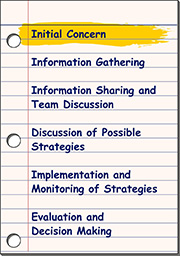What are the stages of the pre-referral process and what do they involve?
Page 4: Stage 1: Initial Concern
 The first stage in the pre-referral process, initial concern, begins when someone—a teacher, parent, or member of the school staff—starts to have concerns about a student’s academic or behavioral performance. This concern may be expressed either informally or formally; however, once the pre-referral process has been initiated in a given school, it should be managed consistently, regardless of the manner in which the original concern was communicated.
The first stage in the pre-referral process, initial concern, begins when someone—a teacher, parent, or member of the school staff—starts to have concerns about a student’s academic or behavioral performance. This concern may be expressed either informally or formally; however, once the pre-referral process has been initiated in a given school, it should be managed consistently, regardless of the manner in which the original concern was communicated.
Informal and Formal Concerns
 Concern expressed informally: A grandparent requests help from the school counselor because his granddaughter, whom he is the primary caregiver for, seems to be having trouble focusing on reading and completing her homework assignments. The counselor may then schedule a pre-referral team meeting.
Concern expressed informally: A grandparent requests help from the school counselor because his granddaughter, whom he is the primary caregiver for, seems to be having trouble focusing on reading and completing her homework assignments. The counselor may then schedule a pre-referral team meeting.

Concern expressed formally: A teacher completes a school form to refer a student to the pre-referral team after that student exhibits problem behavior.
As might be expected, the pre-referral process is most often initiated by a teacher’s formal concern. These kinds of initial concerns about a student are often precipitated by some of the following warning signs:
- Falling grades
- Difficulty comprehending text
- Lack of motivation
- Behavior problems (e.g., acting out in class)
- Non-compliance with teacher requests
- Social-emotional problems (e.g., lack of confidence, appears withdrawn)
- Major life changes (e.g., parent’s divorce, death of a loved one)
- Significant illness or accident (e.g., lengthy hospitalization)
Activity
What About Walker?
 Let’s practice identifying these warning signs. Walker is a fifth-grade student. His teacher, Ms. Peters, has observed some changes in Walker since he returned from the winter break. One obvious change was a broken leg due to a mountain biking accident over the holidays. Walker was even hospitalized for three nights for observation due to a minor concussion. Before the holiday, Ms. Peters thought of Walker as a strong student who paid attention in class, was eager to please and helpful to his classmates, had a good attitude, and was cooperative. He had strong critical reading skills and comprehended materials easily. He consistently made good grades, mostly A’s with an occasional B. Since returning from the break a month ago, however, Ms. Peters has observed Walker reading slowly, so slowly that it impedes his comprehension of the material in his textbooks. He does not recall what he has read and has been failing on weekly quizzes and chapter tests, even though he says he is trying. Ms. Peters feels like Walker is just not as motivated as he used to be. She further notes that she has to give him lots of reminders to begin and pay attention to a task or to complete his work. When she contacted Walker’s parents to ask if they, too, had noticed any changes, they simply stated that Walker seemed to be moody and agitated about having to be on crutches and miss out on his extracurricular sports activities. They were not aware of any problems with his homework, but since he always works in his room with the door closed, they really weren’t sure. Based on this information, do you think Walker is an appropriate candidate for the pre-referral team?
Let’s practice identifying these warning signs. Walker is a fifth-grade student. His teacher, Ms. Peters, has observed some changes in Walker since he returned from the winter break. One obvious change was a broken leg due to a mountain biking accident over the holidays. Walker was even hospitalized for three nights for observation due to a minor concussion. Before the holiday, Ms. Peters thought of Walker as a strong student who paid attention in class, was eager to please and helpful to his classmates, had a good attitude, and was cooperative. He had strong critical reading skills and comprehended materials easily. He consistently made good grades, mostly A’s with an occasional B. Since returning from the break a month ago, however, Ms. Peters has observed Walker reading slowly, so slowly that it impedes his comprehension of the material in his textbooks. He does not recall what he has read and has been failing on weekly quizzes and chapter tests, even though he says he is trying. Ms. Peters feels like Walker is just not as motivated as he used to be. She further notes that she has to give him lots of reminders to begin and pay attention to a task or to complete his work. When she contacted Walker’s parents to ask if they, too, had noticed any changes, they simply stated that Walker seemed to be moody and agitated about having to be on crutches and miss out on his extracurricular sports activities. They were not aware of any problems with his homework, but since he always works in his room with the door closed, they really weren’t sure. Based on this information, do you think Walker is an appropriate candidate for the pre-referral team?
Teachers who suspect that a student may have some learning difficulties might benefit from completing this warning signs worksheet before contacting the pre-referral team. If teachers notice several of the warning signs listed below, they may need to initiate the pre-referral process for the student.
| Directions: Check YES or NO in the columns to indicate your response to the questions. | YES | NO | NEED MORE INFO |
| 1. Does the student have a history of academic or social problems? | |||
| 2. Have you noticed changes in the student’s grades? | |||
| 3. Does the student appear uninterested in or unmotivated by his or her schoolwork? | |||
| 4. Does the student have trouble paying attention in class? | |||
| 5. When given an independent assignment, does the student have trouble completing the work? | |||
| 6. Does the student’s behavior (e.g., a tendency to avoid tasks or get easily frustrated) interfere with his or her class performance? | |||
| 7. Does the student appear to have difficulty understanding assignments and tasks? | |||
| 8. Has the student had any significant life events in the past year that might interfere with his or her school performance? | |||
| 9. Do parents note similar concerns at home? |
This is how your worksheet should be marked. (Please note: No specific number of questions needs to be checked before a teacher can contact the pre-referral team. The worksheet allows the teacher to begin to identify potential areas of concern or to identify areas in which more information is needed).
| YES | NO | NEED MORE INFO |
|
| 1. Does the student have a history of academic or social problems? | |||
| 2. Have you noticed changes in the student’s grades? | |||
| 3. Does the student appear uninterested in or unmotivated by his or her schoolwork? | |||
| 4. Does the student have trouble paying attention in class? | |||
| 5. When given an independent assignment, does the student have trouble completing the work? | |||
| 6. Does the student’s behavior (e.g., a tendency to avoid tasks or get easily frustrated) interfere with his or her class performance? | |||
| 7. Does the student appear to have difficulty understanding assignments and tasks? | |||
| 8. Has the student had any significant life events in the past year that might interfere with his or her school performance? | |||
| 9. Do parents note similar concerns at home? |
| #1: | This student has been in the same classroom for several months with no history of any academic or social concerns. |
| #2, #4, #5, & #7: | These are all behaviors that the teacher has directly observed and noted as changes from the student’s earlier behavior. |
| #3: | Although the teacher believes the student to be unmotivated, the student reports that he is trying; therefore, more information may be needed. |
| #6: | This question cannot be answered with the limited information you were provided, though it’s possible that some respondents might have answered “yes,” given the available information. |
| #8: | Walker did in fact have an accident over the holidays that directly correspond to the time that he began having trouble at school. |
| #9: | Walker’s parents have reported that they have noticed his moodiness but are not aware of other issues. Respondents may have scored this question “Need More Info.” |
Pre-referral at Macy Middle School

Stage 1: Initial Concern
One of Jeremy’s teachers, Mrs. Marks, is concerned with his lack of organization and inattentive behavior. She tells Mr. Young that he rarely turns in his assignments, doesn’t seem to focus on independent work, and appears to have trouble simply paying attention. Mrs. Marks tries some strategies (e.g., moving his seat, providing daily reminders to put completed homework in the basket on her desk), but nothing seems to have worked. Mrs. Marks decides to bring her concern to the pre-referral team.